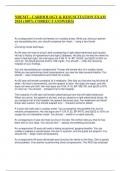NREMT - CARDIOLOGY & RESUSCITATION EXAM
2024 (100% CORRECT ANSWERS)
An unresponsive 3-month-old female is in cardiac arrest. While you and your partner
are resuscitating her, you should compress her chest: - using a two thumb
—
encircling hands technique.
An 84-year-old male is lying in bed complaining of right-sided weakness and nausea.
He has a history of hypertension and type 2 diabetes. He tells you he was fine when he
went to bed last night. His vital signs are P 68, R 14, BP 142/82, and SpO2 is 95% on
room air. His blood glucose level is 168 mg/dL. You should: - notify the receiving
hospital of your findings.
You are resuscitating an unresponsive 74-year-old female who is in cardiac arrest.
While you are performing chest compressions, you see her take several breaths. You
should: - stop compressions and check for a pulse.
An 83-year-old female complains of a headache. She tells you that she has felt tired all
week. Her face is symmetrical, and her speech is clear. Her grips are equal, and she
does not have arm drift. Her vital signs are P 84, R 16, BP 188/100, and SpO2 is 97%
on room air. You should: - transport her to the hospital.
The husband of a 56-year-old female called because she has left-sided weakness.
When you arrive, her speech is slurred, and you observe a right-sided facial droop. As
you transport her to the hospital, her speech becomes clear. Her weakness and facial
droop also resolve. You should suspect a(n): - transient ischemic attack.
A 3-year-old male was in cardiac arrest. You successfully resuscitated him, but he
remains unresponsive. His vital signs are P 124, R 22, BP 94/70, and SpO2 is 100% on
oxygen by non-rebreather mask. You should: - switch to a nasal cannula.
An unresponsive 2-year-old male is lying in his bed. His mother tells you that he has
been sick for four days. You should next: - assess his breathing and pulse.
An unresponsive 20-year-old male is taking occasional, gasping breaths. You are
unable to palpate a carotid pulse. His skin is cyanotic, and his pupils are pinpoint. You
should first: - begin chest compressions.
An unresponsive 94-year-old female was found by her family on the floor. She is apneic
and pulseless. Your partner is performing chest compressions. The AED has analyzed
, her rhythm and advised that you shock the patient. After the AED has charged, you
should next: - ensure no one is touching her.
A 68-year-old male complains of difficulty breathing. He tells you that it gets worse when
he walks up the stairs. You auscultate fine crackles in the bases of his lungs. His vital
signs are P 92, R 18, BP 148/94, and SpO2 is 89% on room air. You should: -
administer oxygen by non-rebreather mask.
An 85-year-old male tells you that he woke up sweaty and nauseated. He tells you he
has a funny feeling in his chest that he cannot specifically describe. He tells you he has
a history of diabetes and hypertension. His lungs are clear to auscultation. His vital
signs are P 104 and irregular, R 14, BP 102/88, and SpO2 is 91% on room air. You
should first: - administer oxygen.
An 88-year-old male was successfully resuscitated after he collapsed. You performed
CPR and defibrillated him once. He tells you that he does not remember the event. His
vital signs are P 96, R 12, BP 108/86, and SpO2 is 95% on oxygen by simple face
mask. You should transport him and: - continue your treatment.
A 59-year-old male complains of dizziness and palpitations. He denies dyspnea. His
vital signs are P 178, R 16, BP 92/56, and SpO2 is 94% on room air. You should: -
administer oxygen by nasal cannula.
A 94-year-old female complains of increased fatigue for the past day. Her skin is cool
and clammy. Her vital signs are P 104, R 18, BP 92/66, and SpO2 is 94% on room air.
You should first: - administer oxygen.
What is the primary cause of a cardiac arrest for a patient who is struck by lightning? -
Asystole
A 37-year-old male complains of a sudden onset of severe headache and blurred vision
in his left eye. When he speaks, he uses the wrong words to describe his complaint. His
pupils are equal and reactive to light. His vital signs are P 84, R 16, BP 148/90, and
SpO2 is 95% on room air. You should suspect: - stroke.
An 81-year-old male is experiencing chest pain. He has no signs of dyspnea or shock.
Why should you target oxygen administration to a SpO2 between 94%-99%? - To
reduce production of free-radicals
An unresponsive 78-year-old male was found on the tiled floor of his bathroom. His
clothing is wet, and you smell urine. You do not observe chest rise or feel a pulse. His
skin is cyanotic. His hands and feet are cold to the touch. His core is warm. You should
suspect: - cardiac arrest and begin chest compressions.




